Huawei is making strategic moves to capture a larger share of the rapidly growing artificial intelligence (AI) chip market in China, setting its sights on challenging Nvidia’s longstanding dominance. As AI technology becomes more embedded in various sectors like healthcare, finance, and automotive, the demand for powerful and efficient chips capable of supporting AI applications has surged. Nvidia, with its leading-edge GPUs and AI-specific hardware, has been a major player in this arena worldwide. However, Huawei is positioning itself to carve out a substantial presence in the Chinese market, capitalizing on the country’s growing demand for AI and the push for technological self-sufficiency.
Huawei has significantly ramped up its investments in AI chip development, positioning its Ascend series of chips as direct competitors to Nvidia’s industry-leading GPUs. These chips are designed to handle AI tasks more efficiently, with a focus on providing the computational power necessary to support the wide range of AI workloads seen across industries today. The Chinese tech giant sees a unique opportunity to take a strong foothold in the AI chip market, driven by domestic needs and the government’s ongoing push for technological innovation and independence.
One of the critical factors fueling Huawei’s ambition is the increasing demand within China for homegrown technologies. The geopolitical tensions between the U.S. and China, particularly in the tech space, have made it more challenging for Chinese companies to rely on foreign suppliers. In this context, Huawei has found an opportunity to further its ambitions by developing AI chips domestically, thus reducing its dependence on U.S. technology. Huawei has been adversely impacted by U.S. sanctions in recent years, which have limited its access to Nvidia’s chips and other critical technologies, but the company is now looking to bypass these restrictions by offering alternatives that are tailored for the Chinese market.
Huawei’s foray into the AI chip market is part of a broader effort to diversify its business. Once heavily reliant on its smartphone sales, Huawei has faced significant obstacles in the mobile space due to both international sanctions and stiff competition from other smartphone makers. As a result, the company is increasingly focusing on areas where it sees more growth potential, such as semiconductor manufacturing, AI, and 5G technology. By developing its own AI chips, Huawei can not only reduce its reliance on foreign suppliers but also position itself as a key player in the next wave of technological advancements that will define industries for years to come.
The Chinese government has been a strong advocate for AI innovation, seeing it as a crucial driver of economic growth and technological leadership in the 21st century. This has resulted in a favorable environment for Huawei and other domestic companies to thrive in the AI space. As a leading Chinese tech company, Huawei has the backing of the government and the country’s robust infrastructure, both of which provide it with a significant edge in its efforts to develop cutting-edge AI hardware. However, Huawei will still have to overcome considerable competition from Nvidia, which currently holds a dominant position globally, particularly in the AI and deep learning markets.
Nvidia’s AI chips are renowned for their performance and efficiency, making them the go-to solution for many companies looking to build AI-driven products and services. The U.S.-based firm also has a large ecosystem of partnerships with major global players, further consolidating its position at the top of the AI chip market. For Huawei, competing against Nvidia will require not just technological innovation but also establishing its reputation as a reliable and efficient alternative, both within China and internationally.
Despite these challenges, Huawei’s efforts to grab market share from Nvidia in the AI chip sector reflect the growing importance of AI technologies and the competitive race to dominate this emerging field. The company’s strategic push into AI chips will likely have broad implications not only for the future of AI but also for the semiconductor industry as a whole. As countries around the world increasingly seek to develop their own advanced technologies, Huawei’s ambition to take on Nvidia highlights a global shift toward self-reliance in critical tech sectors.
Looking ahead, Huawei aims to leverage its expertise in AI chip development to expand its footprint beyond China, positioning itself as a key player in the global AI market. The company is focused on building chips that will meet the growing demand for AI-driven innovations, particularly in fields like autonomous vehicles, robotics, and smart cities. While Nvidia remains the dominant force in the industry, Huawei’s efforts to challenge this position underscore the increasing significance of AI hardware and the role it will play in shaping the future of technology worldwide.
If Huawei succeeds in developing competitive AI chips, it could reshape the AI hardware landscape and influence global technology trends for years to come. As the company continues to ramp up its R&D efforts and expand its semiconductor capabilities, Huawei’s potential to disrupt the AI chip market remains a key point of focus for industry observers and competitors alike.



